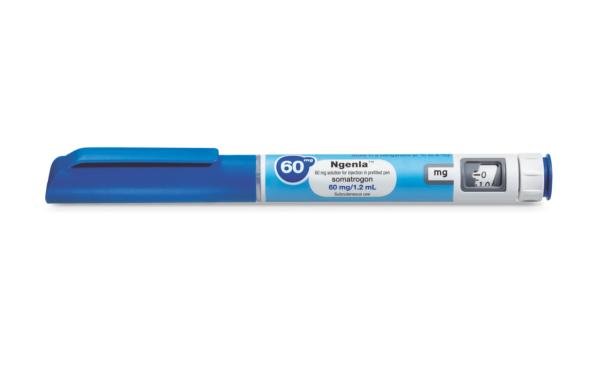Somatrogon Disease Interactions
There are 8 disease interactions with somatrogon.
- Active malignancy
- Acute critical illness
- Diabetic retinopathy
- Prader-Willi Syndrome
- Intracranial hypertension
- Scoliosis
- Diabetes mellitus
- Turner syndrome
Human growth hormone (applies to somatrogon) active malignancy
Major Potential Hazard, Moderate plausibility. Applicable conditions: Breast Cancer, Prostate Cancer, Brain/Intracranial Tumor, Skin Cancer, Bladder Cancer, Lung Cancer
Somatropin and somatrogon are contraindicated in the presence of any active malignancy. Any preexistent malignancy should be inactive and its treatment should be completed prior to somatropin therapy. This includes the presence of any intracranial tumor. Somatropin and somatrogon should be discontinued if there is any evidence of recurrence.
Human growth hormone (applies to somatrogon) acute critical illness
Major Potential Hazard, Moderate plausibility. Applicable conditions: Pulmonary Impairment, Acute (Surgical) Abdomen, Sepsis
Treatment with somatropin and somatrogon is contraindicated in patients with acute critical illness due to any complications following open heart surgery, abdominal surgery, multiple trauma, or acute respiratory failure. Patients with these conditions have an increased risk of mortality.
Human growth hormone (applies to somatrogon) diabetic retinopathy
Major Potential Hazard, Moderate plausibility.
Somatropin and somatrogon is contraindicated in patients with active proliferative or severe non-proliferative diabetic retinopathy.
Human growth hormone (applies to somatrogon) Prader-Willi Syndrome
Major Potential Hazard, Moderate plausibility. Applicable conditions: Pulmonary Impairment, Obesity, Sleep Apnea
Somatropin and somatrogon is contraindicated in patients with Prader-Willi Syndrome who are severely obese, have a history of upper airway obstruction or sleep apnea, or have severe respiratory impairment. There have been reports of sudden death when somatropin was used in such patients.
Human growth hormone (applies to somatrogon) intracranial hypertension
Moderate Potential Hazard, Moderate plausibility. Applicable conditions: Papilledema Associated with Increased Intracranial Pressure
Intracranial hypertension with papilledema, visual changes, nausea and/or vomiting has been reported in a small number of patients treated with somatropin and somatrogon. Fundoscopic examination should be performed before treatment initiation to exclude preexisting papilledema, and should be continued periodically during treatment. If papilledema is observed during treatment, therapy should be stopped. Treatment could be restarted at a lower dose once intracranial hypertension has been resolved. Patients with Turner Syndrome might be at increased risk of developing intracranial hypertension.
Human growth hormone (applies to somatrogon) scoliosis
Moderate Potential Hazard, Moderate plausibility.
Progression of scoliosis can occur in patients who experience rapid growth. Since somatropin and somatrogon increase growth rate, children with a history of scoliosis should be monitored for progression of this condition. Physicians should be alert for this skeletal abnormality which can be commonly seen in patients with Turner and Prader-Willi syndromes, and can manifest during somatropin and somatrogon treatment.
Somatrogon (applies to somatrogon) diabetes mellitus
Moderate Potential Hazard, Moderate plausibility. Applicable conditions: Turner Syndrome, Obesity
Treatment with growth hormone may decrease insulin sensitivity, inducing a state of insulin resistance and hyperglycemia, especially at higher doses. New onset type 2 diabetes mellitus (DM) or worsened glycemic control in patients with undiagnosed pre-diabetes or DM has been reported in patients receiving growth hormone. Monitor glucose levels in all patients during therapy with somatrogon, especially in those with who have glucose intolerance, or additional risk factors for diabetes (e.g., obesity, Turner syndrome, family history). Initiation of somatrogon in patients who have type 1 or 2 diabetes mellitus may require dose adjustment of anti-diabetic therapy.
Somatrogon (applies to somatrogon) Turner syndrome
Moderate Potential Hazard, Moderate plausibility. Applicable conditions: Diabetes Mellitus
Somatrogon may increase the risk of diabetes mellitus (DM) in patients with Turner syndrome. Monitor blood glucose levels periodically to assess for new onset diabetes in these patients. In patients with Turner syndrome and preexisting DM, monitor blood glucose more closely as adjustment of antidiabetic agents may be required when somatrogon is initiated.
Switch to professional interaction data
Somatrogon drug interactions
There are 437 drug interactions with somatrogon.
Somatrogon alcohol/food interactions
There are 2 alcohol/food interactions with somatrogon.
More about somatrogon
- somatrogon consumer information
- Check interactions
- Compare alternatives
- Side effects
- Dosage information
- During pregnancy
- Drug class: growth hormones
- En español
Related treatment guides
Drug Interaction Classification
| Highly clinically significant. Avoid combinations; the risk of the interaction outweighs the benefit. | |
| Moderately clinically significant. Usually avoid combinations; use it only under special circumstances. | |
| Minimally clinically significant. Minimize risk; assess risk and consider an alternative drug, take steps to circumvent the interaction risk and/or institute a monitoring plan. | |
| No interaction information available. |
See also:
Further information
Always consult your healthcare provider to ensure the information displayed on this page applies to your personal circumstances.


